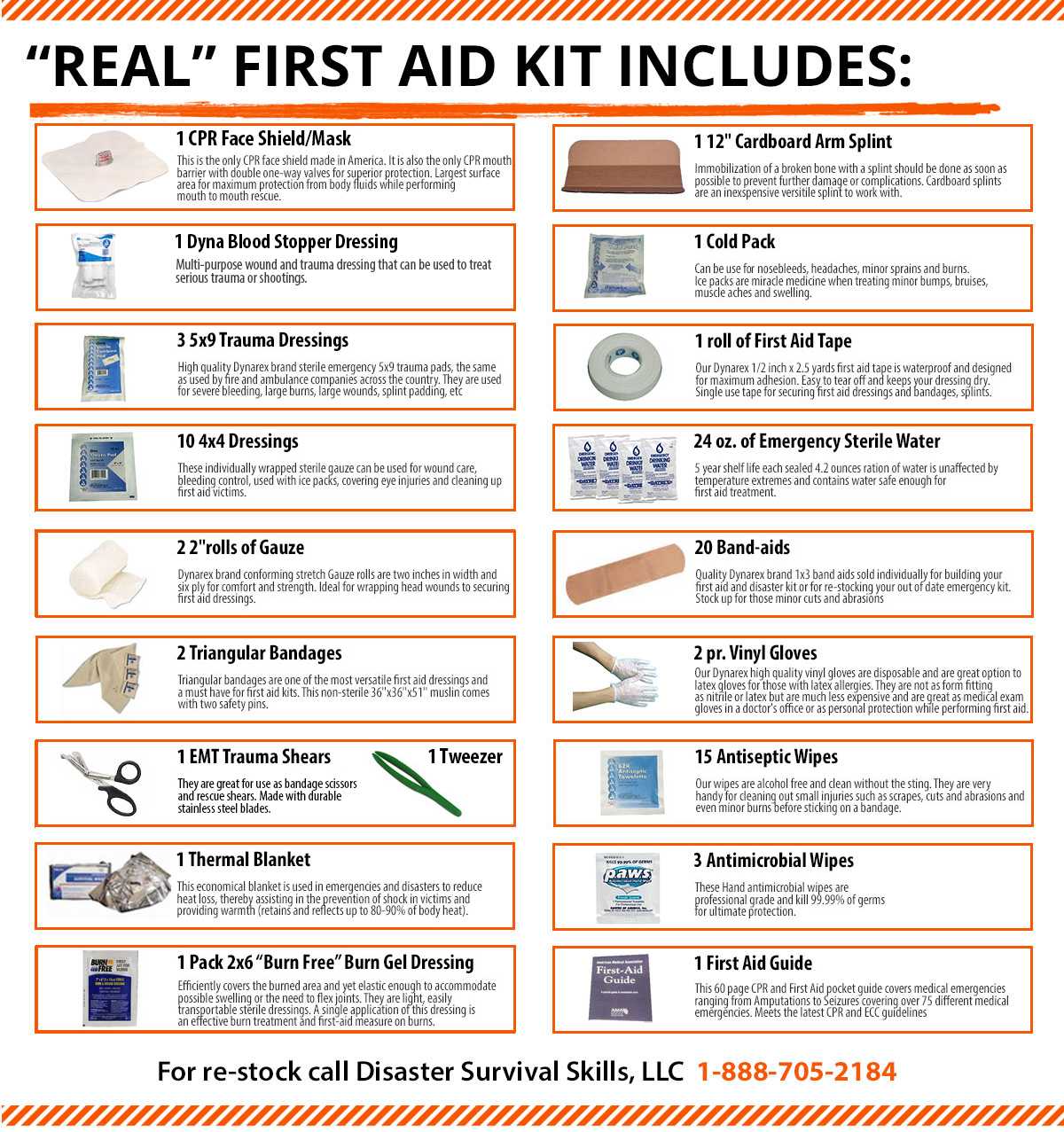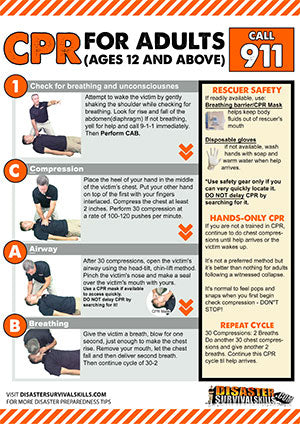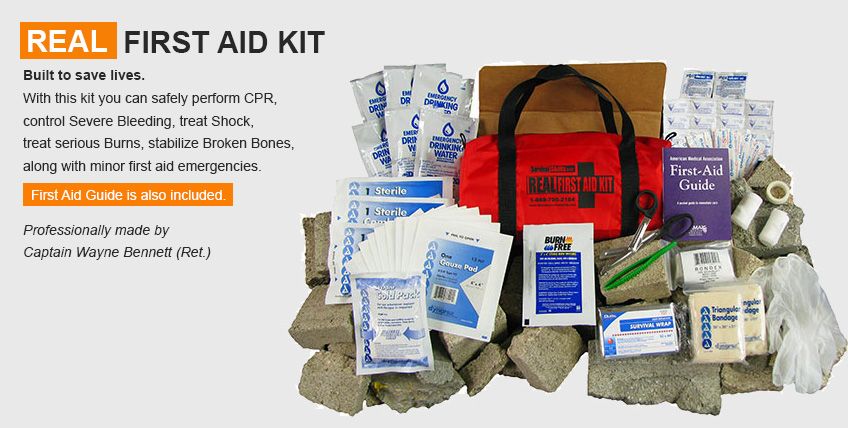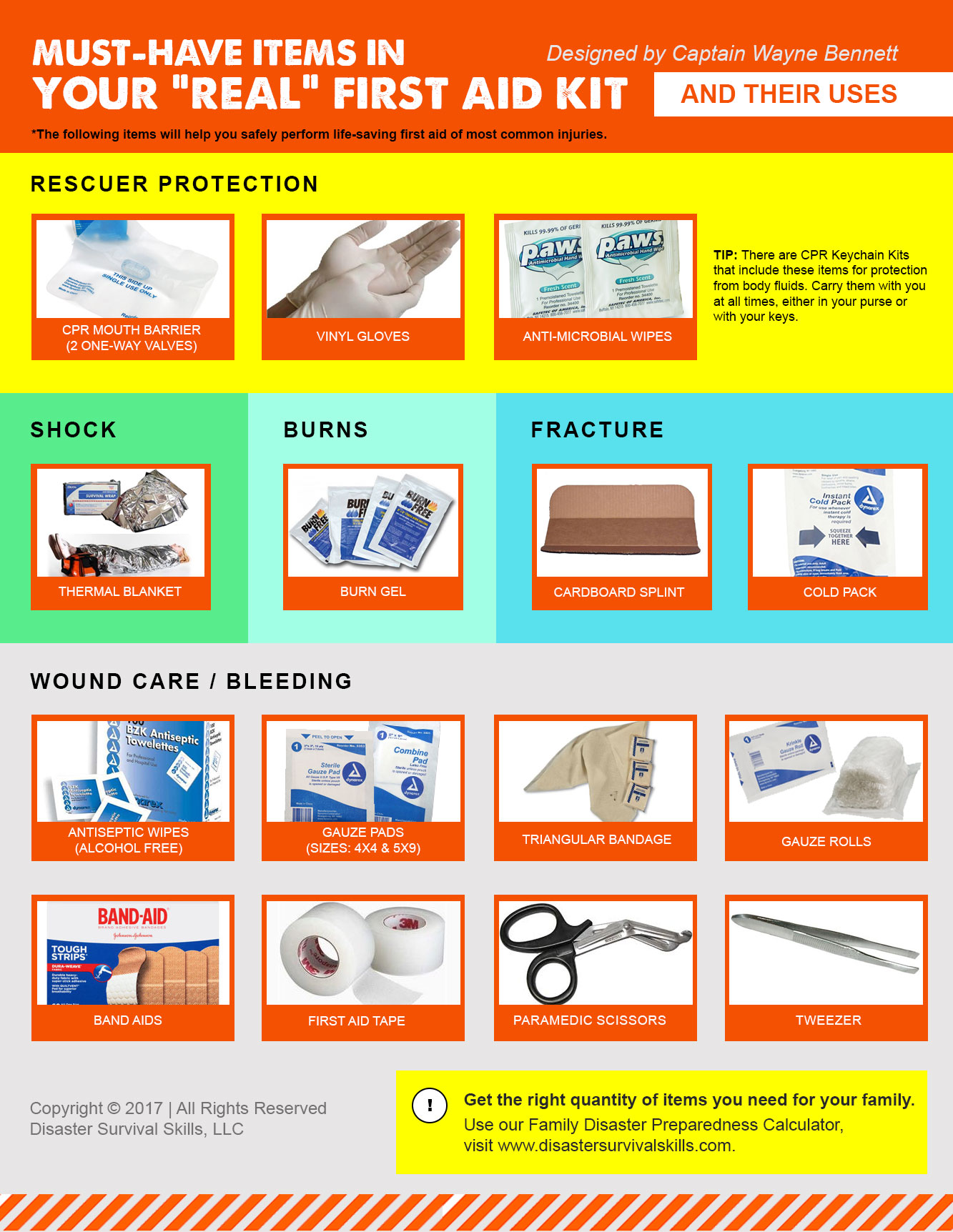Imagine you're faced with an emergency. The first aid kit you grab is your first line of defense, but what if it's filled with items that won't actually help in a serious situation? Most kits are packed with just band-aids and wipes, and some have outdated items not recommended in current first aid practices.
As a former fire fighter with over 33 years experience responding to more than 50,000 emergencies, I got used to using a professional first aid bag. When I started training Disaster Survival Skills workshops, I was frustrated when it came to recommending a first aid kit to my students. So in 1995, out of necessity, I had to create a “real” first aid kit.
The ‘REAL’ First Aid Kit For real-life emergencies
We have included a first aid checklist with the best supplies that can make a difference in a real emergency.
Here's a snapshot of what a "real" first aid kit includes:
- For CPR: A high-quality American-made mouth barrier with a one-way valve. With a real first aid kit you should be able to manage CPR, Severe Bleeding, and Shock as well as other serious injuries, like burns and broken bones. That means the best first aid kit must have contents that are professional high-quality American made. Like our double one-way valve mouth barrier for CPR. Most CPR masks on the market are imported into the United States and licensed as novelty items (toys). These cheap masks have paper filters that offer little if any viral protection.
- For Severe Bleeding: Trauma dressings are a necessity for the control of Severe Bleeding and serious wound care.
- For Burns: Nothing works better than a burn gel dressing. It helps to stop the pain, stop the burn progression, stop infection, prevent hypothermia and best of all, it won’t stick to the burn.
- For Broken Bones: A sturdy splint to immobilize and stabilize fractures.
We also advise against certain items, like hydrogen peroxide and alcohol wipes, which can impede healing. And contrary to popular belief, feminine napkins aren't effective for trauma dressings due to their lack of clotting properties.
First Aid Kit Content List:
- CPR Face Mask/Mouth barrier
- Thermal Blanket
- Burn Gel
- Cardboard Splint
- Cold Pack
- Trauma Dressings
- Triangular Bandages
- Sterile Water
- Gauze Rolls
- First Aid Tape
- Trauma Shears/Scissors
- Tweezer
- Antiseptic Wipes
- Vinyl Gloves
- Antimicrobial Wipes
- Band-Aids

Items that shouldn’t be in your first aid kit
Just as important are the items that should be left out of the first aid kit. Items such as hydrogen peroxide and alcohol wipes have been shown to damage tissue and capillaries. These contents also slow the healing of wounds. Also butterfly bandages- can lead to trapping in a septic infection, aspirin- can lead to internal bleeding and thin the blood, and bite sticks for seizures are also items that should definitely be left out of kits.
Also, a common myth is that feminine napkins make great trauma dressings. Since feminine hygiene pads have no clotting ability. They should never be used in the place of trauma dressings which will aid in the clotting of blood.
How to use your real first aid kit
Many people do not have first aid kits in their home, car or office because they just don’t know how to use them. So along with this post, I want to share with you how to use a real first aid kit in case of life-threating emergency.

- For CPR (Download the CPR poster here)
- Check for breathing and unconsciousness. If not breathing yell for help and CALL 911 Immediately then Perform CAB.
- Compressions. Place the heel of your hand in the middle of the victim’s chest. Put your other hand on top of the first with your fingers interlaced. Compress the chest at least 2 inches. Perform 30 compressions at a rate of 100-120 pushes per minute.
- Airway. After 30 compressions, open the victim’s airway using the head tilt, chin lift method. Use the CPR mask and place to the victim’s mouth. Pinch the victim’s nose and make a seal over the victim’s mouth with yours.
- Breathing. Give the victim a breath, blow for 1 second, just enough to make the chest rise. Remove your mouth, let the chest fall and then deliver the second breath.
- REPEAT CYCLE 30 Compressions: 2 Breaths Continue this CPR cycle till help arrives.
First Aid Treatment For Bleeding
- For Severe bleeding cover with 5×9 trauma dressing and hold firm direct pressure. Never remove the dressing. Call 9-1-1.
- For minor to moderate bleeding use 4×4 gauze pads again applying firm direct pressure (no peeking)
First Aid Treatment For Shock
Anyone breathing but unconscious elevate feet 6-12 inches, cover with Thermal Blanket, Call 9-1-1.
First Aid Treatment For Burn.
First Aid Treatment For Bone Fracture.
- Check for deformity, pain, swelling, check for pulse below the fracture before applying splint. Pad splint with gauzeand secure with gauze roll.
- Place gauze over swelling prior to applying ice pack. Leave on for maximum 20 min.




I will like you to send me the list of items found in a first aid kit and their uses
How to order this first aid kit and how much and how long for distributed